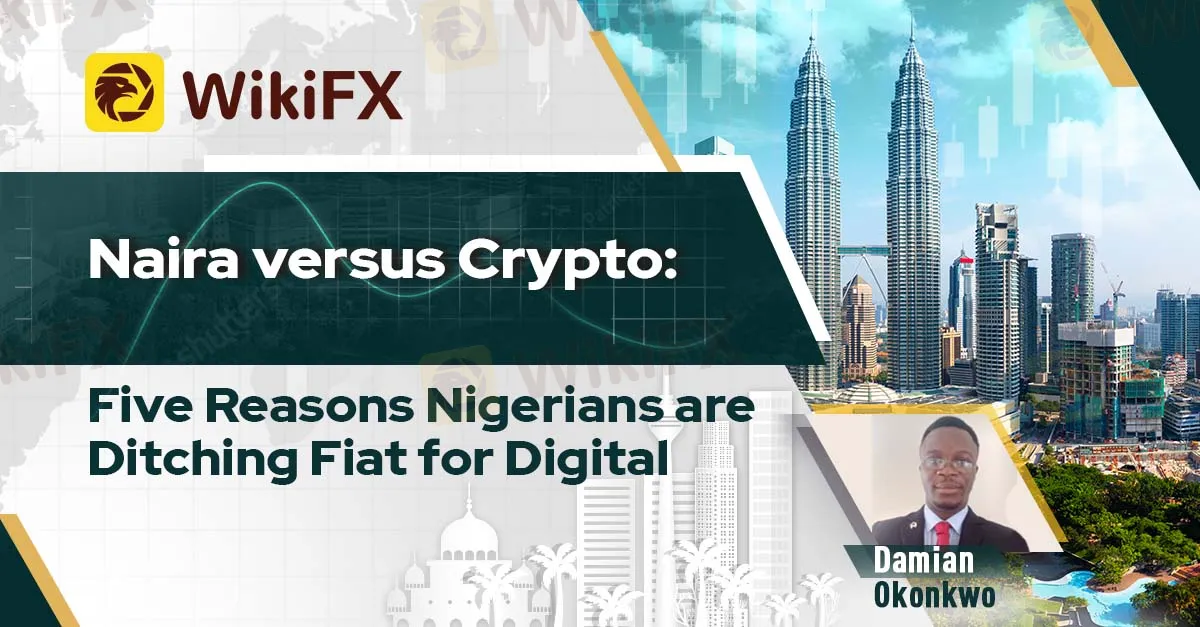Abstract:The shift from traditional fiat currencies to cryptocurrencies in Nigeria is a multifaceted phenomenon driven by factors ranging from financial inclusion to economic uncertainties. While this trend presents new opportunities for individuals, it also raises challenges for regulatory bodies to adapt and establish frameworks that ensure consumer protection and financial stability.

By: Damian Okonkwo

Introduction
In recent years, Nigeria has experienced a significant shift in its financial landscape as more and more individuals are turning away from traditional fiat currencies, such as the Naira, in favor of digital currencies, particularly Bitcoin and altcoins. This growing trend raises several questions about the factors influencing this shift and its potential implications for the Nigerian economy. In this article, we will explore five key reasons why Nigerians are increasingly embracing cryptocurrencies over traditional fiat currencies.
Five Key Reasons Why Nigerians are Increasingly turning to Cryptocurrencies over Traditional Fiat Currencies
Here are some of the major reasons why Nigerians are increasingly turning to Cryptocurrencies over traditional fiat currencies:
a) Financial Inclusion and Accessibility: One of the primary reasons driving the adoption of cryptocurrencies in Nigeria is the issue of financial inclusion. Despite being the largest economy in Africa, a significant portion of the population still lacks access to basic banking services. Cryptocurrencies, with their decentralized nature, provide an avenue for the unbanked and underbanked to participate in the financial system. The ease of access to cryptocurrencies through mobile devices has been a game-changer, allowing Nigerians to engage in financial transactions without the need for a traditional bank account.
b) Remittances and Cross-Border Transactions: Nigeria has a large diaspora, with many Nigerians living and working abroad. The traditional methods of sending money across borders are often costly and time-consuming. Cryptocurrencies offer a more efficient and cost-effective alternative for remittances. Blockchain technology enables faster and cheaper cross-border transactions, reducing the reliance on traditional remittance services and the associated fees. As a result, many Nigerians are turning to cryptocurrencies to send and receive money internationally.
c) Currency Depreciation and Economic Uncertainty: The Naira has faced a history of volatility and depreciation, leading to concerns about its stability as a store of value. Cryptocurrencies, particularly Bitcoin, are often viewed as a hedge against economic uncertainty and currency devaluation. Nigerians, seeking a more stable and resilient form of wealth preservation, are increasingly turning to cryptocurrencies as a means of protecting their assets from the inflationary pressures often associated with fiat currencies.
d) Youthful Population and Tech-Savvy Culture: Nigeria has a youthful population, with a significant percentage of the demographic being tech-savvy. The younger generation, comfortable with digital technology, is more inclined to explore and adopt new financial instruments, including cryptocurrencies. The rise of cryptocurrency exchanges and wallets that are user-friendly and accessible via mobile apps has played a crucial role in attracting this demographic to the world of digital currencies.
e) Entrepreneurial Opportunities and Investment Potential: Cryptocurrencies offer Nigerians new avenues for investment and entrepreneurial activities. The decentralized nature of many cryptocurrencies allows individuals to participate in projects and investments that may not be feasible within the traditional financial system. The allure of potential high returns and the democratization of investment opportunities are enticing many Nigerians to diversify their portfolios by including digital assets.
The Future of Cryptocurrencies in Nigeria
The future of cryptocurrencies in Nigeria appears dynamic and full of potential. As the government, regulators, and industry participants navigate the evolving landscape, finding a regulatory framework that encourages innovation while mitigating risks will be essential. If successful, Nigeria could position itself as a regional hub for cryptocurrency adoption, fostering economic growth and financial inclusion.
Conclusion
The shift from traditional fiat currencies to cryptocurrencies in Nigeria is a multifaceted phenomenon driven by factors ranging from financial inclusion to economic uncertainties. While this trend presents new opportunities for individuals, it also raises challenges for regulatory bodies to adapt and establish frameworks that ensure consumer protection and financial stability. As the crypto landscape in Nigeria continues to evolve, it will be crucial to monitor how the government, financial institutions, and the public respond to this paradigm shift in the country's financial ecosystem.











